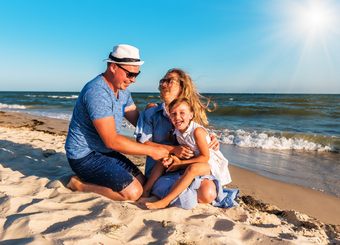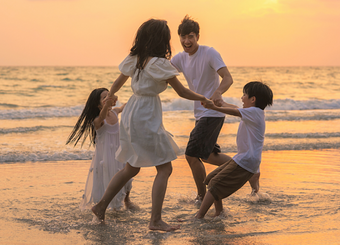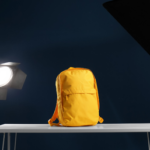There’s rarely a more cherished memory than a family beach day, with fun, relaxation and the beautiful ocean at the forefront, what more could anyone want? In fact, family beach days are such a cherished occasion for so many families that they have spawned their own photography niche – the Beach Family Photos. Perfect family beach photos are the cream of the crop when it comes to the family photoshoot, as no studio set up can ever compare to the natural beauty of the beach at sunset.
As such, beach family photography is a great niche to get into for budding photographers who want to boost their portfolio with beautiful and enjoyable work outdoors. To get into the family beach portrait session market however, a photographer will need to have a camera that can handle whatever the beach can throw at it, and know a few key tricks to make their photos stand out.
The Best Cameras That Can Survive Family Beach Pictures
Olympus Tough TG-6
The Olympus TG series has a solid reputation among the tough camera market, not only for being able to handle tough conditions, but also for being equipped with impressive imaging and video tech.
 The Olympus Tough TG-6 has the ability for Raw-shooting, 4K-shooting, and even has some nifty new features like improved LCD resolution and an Underwater Microscope mode for getting in close. The TG-6 also has a generous 25-100mm optical zoom lens that lets you get closer and closer to the action, making the camera overall a straightforward but sophisticated option, and one of the best beach ready cameras around.
The Olympus Tough TG-6 has the ability for Raw-shooting, 4K-shooting, and even has some nifty new features like improved LCD resolution and an Underwater Microscope mode for getting in close. The TG-6 also has a generous 25-100mm optical zoom lens that lets you get closer and closer to the action, making the camera overall a straightforward but sophisticated option, and one of the best beach ready cameras around.
“Beach family photos are simple on the surface, but due to uncontrolled nature of the set, it can be very difficult to get the results your desire right off the bat.”
Panasonic Lumix TS30
The Panasonic Lumix TS30 has aged over the years and as such it doesn’t quite offer any best-in-class specs, but what it does offer is a very reasonable asking price. The TS30 is a solid and versatile waterproof camera that should prove well-suited to recording your aquatic adventures, and its slim enough to fit in a snug jeans pocket or similar. If you’re looking for a cheap and easy point and shoot to whip out whenever you need a bit of rugged durability, then look no further than the Panasonic Lumix TS30.
Ricoh WG-70
The Ricoh WG series has a reputation of being the Swiss army knives of tough cameras. Like its predecessors, the WG-70 is equipped with ring lights around its lens that function as a torch as well as a macro light, allowing you to see what you’re doing while keeping your subjects illuminated. This is only further benefited by the cameras, the Handheld Night Snap mode which captures several images of a low-light scene in quick succession and blends them together to create a blur-free composite image. All these features are housed in a body with serious protections, able to stay submerged in 14m of water for up to 2 hours. If you’re after a tough little number that can work in less than bright conditions, then this is the camera for you.
Once you’ve got your camera, the next step is to learn how to use it. Beach family photos are simple on the surface, but due to uncontrolled nature of the set, it can be very difficult to get the results your desire right off the bat. Luckily, with a few tips you can make any family picture ideas into reality and help your photos stand out from the crowd.
How To Make Your Family Beach Photos Stand Out
Shoot in RAW
The two main photo formats available on a digital camera are JPG and RAW. RAW is an uncompressed version of an image file, which keeps all the image’s data from the get-go. This means you can more easily edit your photos in post-processing, which is great flexibility for any photographer as shooting water and sunshine takes a tremendous amount of skill. Shooting in RAW will allow you to fix the over and underexposure that results in poor photographs.
Frame With a Focal Point
“Try focusing on a focal point in some of your nature shots and notice the difference instantly.”
Although you might enjoy watching the waves crashing onto the shore, it may not make the best photograph because you’ll be lacking a focal point.
 A focal point is photography concept that can really help elevate an image, and can be something as simple as a chair or a shell. The goal of a focal point is to draw the viewer’s attention and provides context for the shot, helping tell a visual story and give the viewer an anchor point. Try focusing on a focal point in some of your beach shots and notice the difference as your photos go from amateur to professional in no time.
A focal point is photography concept that can really help elevate an image, and can be something as simple as a chair or a shell. The goal of a focal point is to draw the viewer’s attention and provides context for the shot, helping tell a visual story and give the viewer an anchor point. Try focusing on a focal point in some of your beach shots and notice the difference as your photos go from amateur to professional in no time.
Shoot During Golden Hour
You probably love watching the sunrise or sunset at the beach, and that’s for good reason as those “golden hours” are the best times for taking photos. “Golden hour” is the time shortly after sunrise and shortly before sunset when the sky is redder and softer than when the sun is up. At this time of day, photos are less likely to come out overexposed, so photographers consider it the most desirable time of day for nature photography.
Experiment with Polarized Filters
Polarizing filters enhance blues, darken shadows, and suppress glare from reflective surfaces, excellent features for beach photo shoot. As such, if you’re serious about beach photography then a polarized lens can be a worthwhile investment, especially if you’re doing middle-of-the-day shoots. If you’re not taking photos during the “golden hour,” consider using a polarizing filter to prevent overexposure and enhance colours.
Use a Wide Lens
“If you follow the wide-angle lens rule of “low and close”, you can find success”
Professional landscape photographers use wide-angle lenses to make their foreground seem bigger, drawing the viewer in and creating a sense of depth. The wide focal range emphasizes objects in the foreground and creates a sense of depth that other lenses cannot match. Learning how to use this lens for family beach photos can be difficult due to subject warping in the foreground, however, if you follow the wide-angle lens rule of “low and close”, you can find some success by capturing the focal point in the foreground as close and as low as possible.
 Consider Your Exposure
Consider Your Exposure
Modern cameras are brilliant devices, but beaches are tricky subjects. There’s a lot of complicated lighting going on, especially if you’re photographing during the golden hour. A camera might automatically underexpose your beach photo if the sun, sky, and sand appear to be too bright. This would render your focal point far too dark — no good!
Instead of letting the camera decide, try utilizing your Exposure Value (EV) dial. Think of the EV dial as an override for your camera’s meter. Upping the EV (say, to +1) will brighten the image. Lowering it (-1, -2, and so on) will darken the photograph. If you’re shooting in RAW, manual mode, check the dial on the camera’s right side for the Exposure Compensation feature. Every modern camera has this and the benefits are hard to top.
Setup Your Shots
You may have already chosen the perfect beach location, but you can still take your photos to the next level with simple setup. Bring along several beach supplies that match well with the aesthetic you’re aiming for, whether it be towels, sandals, beach balls, sunglasses, or a gorgeous printed beach umbrella, they’ll add a stylish finishing touch to your photos. Plus, you can even use the beach umbrella to get some shade in between taking shots!
“Watermarking protects the copyright of your work”
Watermark Your Work
Everyone wants to show off their family beach photos, but no one wants their family beach photos to be stolen and used for some obscure online advertising campaign! This is where watermarking comes in – an important part of the process for all photography niches, watermarking protects the copyright of your work and ensures that it cannot be reused or altered without your permission.
This is perfect in the online photography world as it allows you to publish your work without the threat of theft. In fact, watermarking can also double as a branding tactic. Much like a painter that mark their work with a signature, digital watermarking is a great way to get your name out there and heighten brand awareness.
The best thing about watermarking however, is that it is simple and free when using WaterMarquee!
 WaterMarquee is a free online watermarking service where you simply upload your photos and get them back with a custom watermark in no time at all. WaterMarquee also offers premium services that will help elevate any work you produce and mark you as a true photography professional. So what’re you waiting for? If you want to protect your beach family photos, look no further than WaterMarquee.
WaterMarquee is a free online watermarking service where you simply upload your photos and get them back with a custom watermark in no time at all. WaterMarquee also offers premium services that will help elevate any work you produce and mark you as a true photography professional. So what’re you waiting for? If you want to protect your beach family photos, look no further than WaterMarquee.































